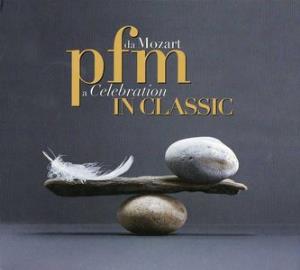For many Italian musicians Premiata Forneria Marconi (PFM) are the pioneers of the Italian progressive rock music (rock progressivo Italiano). Without doubt the band belonged to the leading bands of the prog rock movement in the seventies. Today PFM are still active and they still play their wonderful music during live concerts. All those years, they succeeded in surviving as a band although it wasn't always easy to overcome difficulties. One of the reasons why the band survived is the fact that they came up with new ideas, just like they recently did by mixing their own compositions with those of nine classical composers. They recorded these pieces for a double album called PFM In Classic: Da Mozart A Celebration. For this album the surviving members of the seventies Franz Di Cioccio (vocals, drums, percussion), Patrick Djivas (bass) and Franco Mussida (guitars, vocals) got together with special guest Lucio Fabbri (violin, keyboards) and with guest musicians Roberto Gualdi (drums) and Alessandro Scagleoni (keyboards). Furthermore a complete symphony orchestra joined them in the recording studios. On the first disc PFM joins the classical orchestra to contribute on compositions written by the classical composers Mozart, Saint-SaŽns, DvořŠk, Mahler, Prokofiev, Rimski-Korsakov and Verdi. I guess the most familiar pieces are Il Flauto Magico - Ouverture (The Magical Flute) by Mozart and Romeo E Giulietta - Danza Dei Cavalieri by Prokofiev (Romeo And Juliet - Dance Of The Knights). While listening to these adaptations by PFM and the orchestra, I noticed that the combination of a rock band and a classical orchestra works out very well. On many of such releases the orchestra only gets a small part, but this time they can shine as much as PFM. This is just the way I like it: having the idea of listening to classical music instead of rock music. Rock instruments like the electric guitar and the synthesizer can either play these classical parts next to the classical instruments like violin, flute and cello, but the drummer provides these masterpieces more power. For me the highlight on the first disc is the rendition of Romeo and Juliet. On the second disc the orchestra joins PFM to perform the well-known classical tracks of the band. For many foreign fans it might be difficult to determine which songs are performed, because they all got Italian titles. For example: Four Holes In The Ground is now called La Luna Nuova and The World Became The World is named Impresioni Di Settembre. All these songs are not only announced in the Italian language, but also sung. People who own the original Italian albums won't have any problem with that, because these titles sung in Italian already appeared on the albums Storia Di Un Minuto (1971), Per Un Amico (1972) and L'Isola Di Niente (1974). On the first disc PFM gets enough room to excel on the classical compositions next to the orchestra. This also applies to the orchestra on disc two when they add the orchestral parts to the progressive rock tunes of PFM. These pieces not only get an additional instrumental intro, but also a full orchestral sound. Even some original violin and flute parts are performed by members of the orchestra. Thank goodness, the beautiful parts played originally on the guitars and the keyboards still remained the same! By doing so, the new versions have a touch of the old original PFM tunes. On Suite Italiana the music of PFM and the classical composers have been very well mixed into one superb medley. It starts with Mendelssohn's Sinfonia No 4 Italiana followed by the Italian version of Celebration, a track that made the band known to a wider audience in the seventies. As a bonus you'll get a live track of the rock version of Rossini's William Tell Overture, a piece the band used to play in the seventies as an encore. Unfortunately this version only last for less than three minutes, but it still sounds incredible just like all the other tracks on this album. For people who like a fine mixture of great progressive rock and classical music, this double album is an obliged purchase for your CD collection. All tracks on PFM In Classic: Da Mozart A Celebration are so perfectly performed that I can only give the highest rating of five stars for these pioneers of 'rock progressivo Italiano'. ***** Henri Strik (edited by Peter Willemsen) Where to buy? |
